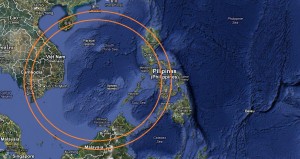Expert: China must abide by Unclos

And the Association of Southeast Asian Nations (Asean) should act decisively on the issue by replacing its “outdated” noninterference and consensus-building policy with a more dynamic majority voting system to get results, said visiting international arbitration expert Yas Banifatemi.
China’s territorial claim is based on history that has been supplanted by modern international sea delineations, said Banifatemi in an interview at the launch on Friday of the Angara Center for Law and Economics, a nonpartisan think tank that aims to undertake economic research and offer public policy advisee to legislators and policymakers.
Banifatemi, a partner at the global law firm Shearman and Sterling’s International Arbitration Group, said China should abide by the United Nations Convention on the Law of the Sea (Unclos), the international agreement that defines the rights and responsibilities of nations in their use of the world’s oceans, establishing guidelines for businesses, the environment and the management of marine natural resources.
“China is bound by Unclos… Its claim is historical. But things have evolved. It’s not a historic title, it’s just history. The way states defined [their boundaries] is not a basis anymore. They have to take international law as it exists,” he said.
Tom Ginsburg, chair of international law at the University of Chicago, said the Philippines’ claim to the Spratlys has merit under international law.
“My understanding of the Law of the Sea basis of the claim is that the Philippines’ claim is actually very strong on the merits according to the substance of international law,” Ginsburg told reporters on the sidelines of the same forum.
Banifatemi said direct negotiations, whether bilateral or multilateral, would still be the best way to settle the conflicting territorial claims.
China claims ownership of the entire Spratlys archipelago, parts of which are also claimed by the Philippines, Brunei, Vietnam, Malaysia and Taiwan.
The Philippines has tried to bring its territorial disputes in the West Philippine Sea to the International Tribunal on the Law of the Sea for arbitration.
However, China insists the disputes should be resolved through bilateral talks and not be raised before international bodies.
The Philippines has been pushing for Asean to take a united stand to settle the dispute, but the regional body is constrained by its internal dynamics. At its recent annual leadership summit in Phnom Penh, Asean for the first time failed to issue a joint communique because Cambodia, the chair, claimed the group failed to come up with a consensus on the Spratlys issue.
Ginsberg said the problem is with the so-called Asean way, which relies on patient consensus-building to arrive at informal or loose agreements.
“Every country has a veto of everything and nothing ever happens,” he said.
“The Asean could maybe move from the policy of unanimity to where you have a majority voting system to make governance decisions as the European Union does,” he said.
Meanwhile, Defense Secretary Voltaire Gazmin told Chinese diplomats on Tuesday that the territorial disputes in the West Philippine Sea should be resolved based on international law and that the defense establishments of both countries should continue their dialogue to keep the peace.
Speaking at a Chinese embassy event on Tuesday to mark the 85th anniversary of China’s People Liberation Army, Gazmin said the Armed Forces of the Philippines and the PLA should also work together to maintain regional stability “amidst these difficult times.” With a report from Philip C. Tubeza
For comprehensive coverage, in-depth analysis, visit our special page for West Philippine Sea updates. Stay informed with articles, videos, and expert opinions.